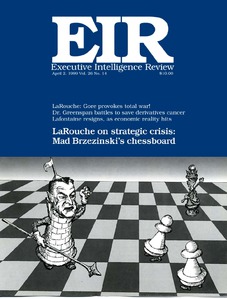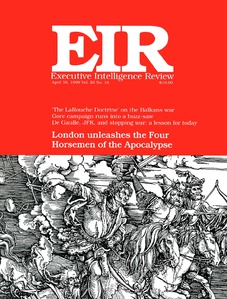This Week in History
March 22-28, 2015
British Assault on the Treaty of Westphalia:
NATO Bombs Serbia, March 1999
By Nancy Spannaus
There are occasions in which we must turn to the negative developments in our history, in order to better understand and correct the course which mankind, almost unthinkingly, is pursuing to its doom. Such a development was the NATO bombing of Serbia, outside the authority of the United Nations or any other international body of law, which began on March 24, 1999. That bombing was a turning point in the process of escalating provocations by the London-steered financial oligarchy, against the concept of a world order based on cooperation between sovereign nation states, the process which is currently bringing us to the cusp of World War III.
Most Americans didn't even give it a thought at the time. So, a little country accused of brutalizing its people was bombed? So what? But insightful strategic thinkers could read the handwriting on the wall. Among them was Lyndon LaRouche, who issued a series of memoranda on the dangers of the unilateral bombing, as a potential step toward global war. Others included the leadership of Russia, which, to this day, cites the Serbian precedent both in contrast to the peaceful, electorally ratified accession of Crimea back to Russia, and as an example of the philosophy of NATO's claim to unilaterally enforce its will, in contravention of international law.

Novi Sad on fire, 1999 Federal Republic of Yugoslavia. |
Indeed, it was during the NATO bombing campaign, which lasted all the way until June 10, and included mass destruction of basic infrastructure for the population of Kosovo, that British Prime Minister Tony Blair, a senior partner-in-crime with the U.S.-based architects of this war, spoke at the Chicago Council of Foreign Affairs (April 22), and declared that it was time to supercede the Treaty of Westphalia with his infamous doctrine of "humanitarian (read pre-emptive) war."
The Treaty of Westphalia, as Lyndon Lyndon and Schiller Institute founder Helga Zepp-LaRouche have repeatedly pointed out, was the foundation stone in international law for peaceful coexistence and cooperation among nations. Coming at the end of the Thirty Years War, which was characterized by unspeakable war crimes and slaughter throughout Europe, that 1648 Treaty enshrined two basic principles, upon which peace could be maintained: first, the equal status and sovereignty of nation states; and second, the "benefit of the other," as the necessary principled guide for action of one nation toward the other--contrary to the principle of revenge. Under this Treaty, nations agreed not to impose their wills upon each other, but to cooperate for mutual advantage--a standard, however much breached in practice, which was at the core of Franklin Roosevelt's concept of the United Nations.
 |
 |
|
Left: U.S. Vice-President Albert Arnold "Al" Gore, Jr; right: U.K. Prime Minister Anthony Charles Lynton Blair. |
||
The British (and Bush) faction within the Clinton administration engaged in a relentless drive to implement this Blair doctrine, from 1993 on. In 1993, 1996, and December 1998, U.S., or U.S. and British, bombers had been deployed to strike in Iraq, against alleged violations of UN resolutions on weapons of mass destruction--unilateral actions with no cover of law. The three days of strikes in December 1998, led to a diplomatic blowup with Russia, China, and France, who would not authorize the three days of bombing in the UN Security Council; Russia even withdrew its ambassadors from Great Britain and the U.S.
At the same time, President Clinton himself was attempting to take a different course, particularly with regard to Russia. In this effort, he had been acting in de facto collaboration with Lyndon LaRouche, who was taking a prominent role in discussions with leading circles in Russia (and elsewhere) on addressing the crux of global strategic problem, the implicitly bankrupt, but rapacious world financial system. Clinton was, however, under constant attack from elements within his own government, such as Al Gore, who took an entirely different approach. He found his presidency itself in peril through the British/Republican operation against him, that led to his impeachment in late 1998. It is no wonder that he was often distracted at the crucial time certain outrageous decisions were made.
 |
 |
|
Left: U.S. President William Jefferson Clinton; right: Russia's Prime Minister Yevgeny Maksimovich Primakov. |
||
The launching of the war against Serbia is a case in point. The bombing began at precisely the point that Russian Prime Minister Yevgeni Primakov was scheduled to come to Washington, to visit with the President. Primakov had broken from the Yeltsin policy of subservience to the "shock therapy" takedown of the Russia economy, but was looking to improving relations with Washington, and President Clinton looked forward with optimism to the discussions. But, as Primakov was literally in the air on the way, Vice-President Gore, acting on the basis of a meeting of the "Principals' Committee" of himself, Secretary of State Madeleine Albright, Secretary of Defense William Cohen, chairman of the Joint Chiefs of Staff Harry Shelton, and Gore's own chief of staff, Leon Fuerth, called Primakov to tell him that his arrival in Washington was likely to coincide with the bombing of Serbia. This was contrary to every indication that President Clinton had given. But Clinton was not at this meeting. And when Primakov got the message, he turned around and went home.

See the feature, "Mad Brzezinski's chessboard". |
As EIR elaborated in its April 2, 1999 issue, the bombing overturned 5 long-established elements of international law, declaring the following new perogatives for NATO:
1. NATO can intervene militarily out-of-area, in contravention of Article 5 of the North Atlantic Treaty.
2. After 50 years, NATO is no longer a “defensive alliance,” but has now become an “offensive alliance.”
3. NATO has arrogated to itself the right—against its founding document—to intervene against any sovereign country.
4. NATO has arrogated the right to do so without, and even against, the mandate of any institution, such as the Organization for Security and Cooperation in Europe (OSCE), or the United Nations, as is explicitly demanded by the 1949 North Atlantic Treaty.
5. Finally, the “new NATO” arrogates the right to go to war without the formal consent or mandate of the parliaments and congresses of member countries.
It should be no surprise that this policy--which has expanded since that time--alarmed Russia, and many other nations.

The "LaRouche Doctrine" to deal with the Balkan Crisis is in the last section, "National". |
For his part, Lyndon LaRouche escalated his campaign to provide a peace-winning policy. On April 7, his presidential exploratory committee, LaRouche for a New Bretton Woods, issued a "LaRouche Doctrine" to deal with the Balkan Crisis. In that document (April 16, 1999 EIR), he clearly delineated the British strategic objective behind the crisis, noting that the operation was ultimately aimed at Russia and China, and located the solution within the absolutely required monetary/economic reform which he had designated as the New Bretton Woods. That document, which should be reviewed and read in its entirety, is equally applicable today.
While the United States leadership and population did not respond adequately to LaRouche leadership at that point, fortunately large sections of the world have done so. While the Blair doctrine of pre-emptive war and international diktat has only expanded, the nations of Russia, China, and many others have come together to establish new institutions that could bind nations together around common goals of economic development, and thus provide the basis for a lasting peace. The way is still open for the United States to take up their offer, and reverse the process which found its expression in the bombing of Serbia 16 years ago, and, if not reversed, could lead us to oblivion.
